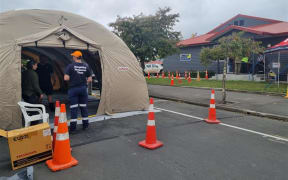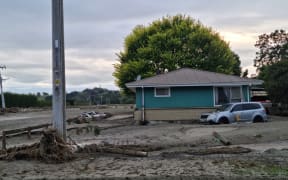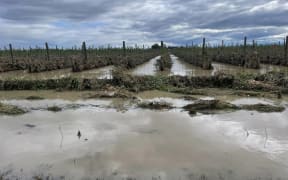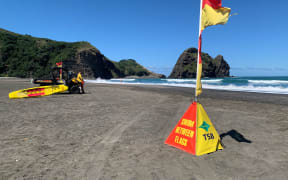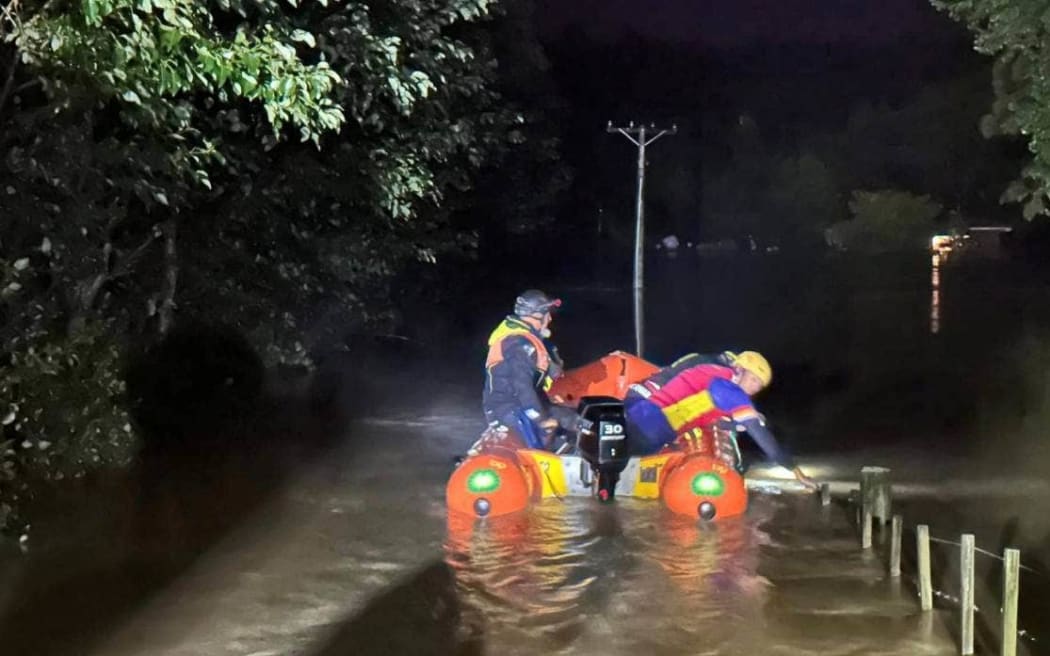
Surf life savers were responsible for rescuing scores of people during the Auckland Anniversary weekend floods (shown here), and Cyclone Gabrielle. Photo: Supplied/ Surf Life Saving Northern Region
Surf Lifeguards say they have been told they should not have responded to calls for help during Cyclone Gabrielle if they did not have the right gear.
Scores of lifeguards saved hundreds of people but ruined their personal wetsuits in the contaminated floodwaters in Hawke's Bay, and in the Auckland floods in January.
Surf Lifesaving NZ said its struggle to get them replaced - and get hold of better gear, called drysuits - was a glaring example of ad hoc rescue systems not keeping pace with the rising threat of flooding.
"We have been informed that our teams should not have responded to the calls for help if they didn't have the appropriate equipment for the job," national search and rescue manager Allan Mundy told RNZ.
"Essentially, this request asks our trained surf lifeguards to choose between saying no to probable drownings or potentially exposing themselves to contamination.
"They are being asked to prioritise lives over plant decisions, although the authorities are leaning towards plant as a primary consideration."
The National Emergency Management Authority (NEMA) said it was working with partners to determine what response capacity, such as training, equipment, and deployment frameworks, will be required.
"NEMA recognises that floods are New Zealand's number one hazard in terms of frequency, losses, and declared Civil Defence Emergency Management emergencies, and the frequency and impact of these events is increasing[ly] driven by climate change," it said on Monday night.
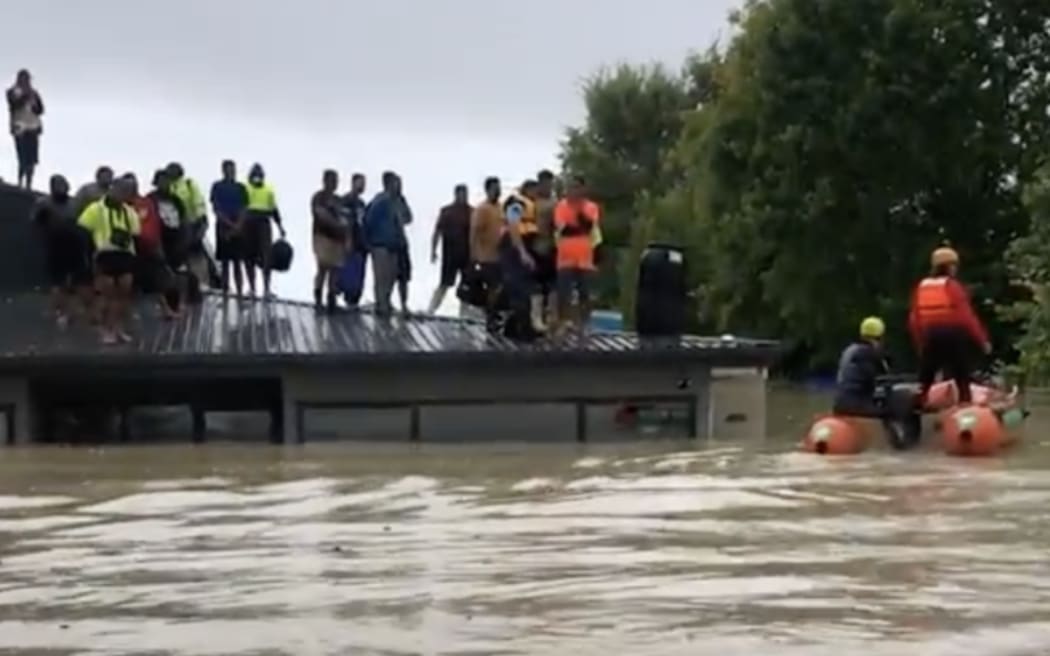
Surf lifeguards saving stranded Hawke's Bay residents during Cyclone Gabrielle. Photo: SUPPLIED
Was it a fair choice confronting the scores of crews who were widely hailed as heroes after the cyclone?
"They're members of this community," said Mundy, who was on inflatable IRB rescue boats in the 2017 Edgecumbe floods, a foretaste of what was to come.
"Put them in the position of saying, 'Well, I made the right decision cos I've still got my $250 wetsuit intact, but three or four people drowned'.
"It sounds a bit over the top, but that's the decision that they were faced with."
Climate change-induced flooding had forced a whole new way of rescuing on to Surf Life Saving (SLS).
It became the go-to boat rescuer in the last two years because its 250 IRBs were so flexible and numerous, and it built on lifeguards' sea skills by adding formal swift water training for 100 volunteers, while another 40 learned to drive boats in floods.
But that had introduced a whole new set of funding squeezes, that were not helped by a multi-million-dollar Budget 2020 boost, because it only covered beach patrol work.
This was made worse by the not-for-profit only having a cost-recovery deal with police, and not with the other government first responders - Civil Defence, and Fire and Emergency.
"This has just blown up in the last 18 months," Mundy said.
"We've had a huge increase in deployment, and that's really impacting on our members because they're losing all this gear because of what they're being asked to do."
Wetsuits that were fine at the beach but not fit-for-purpose in floodwaters replete with sewage or chemicals, and were "probably a really good example of where as a country we need to get up to speed", Mundy said.
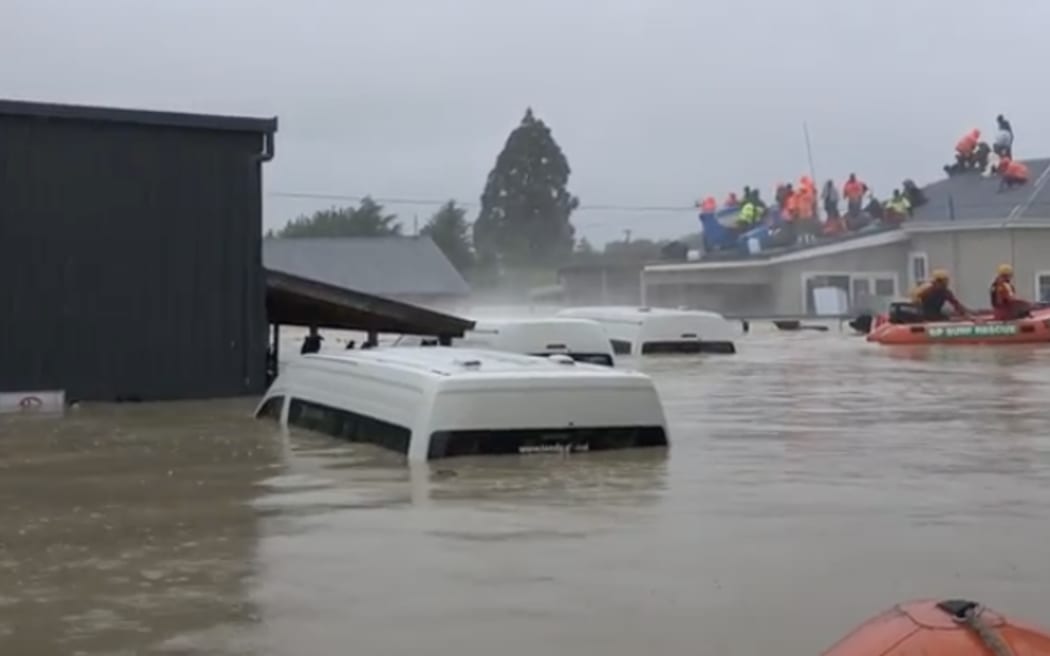
Surf lifesaving crews used IRBs to help evacuate stranded Hawke's Bay residents during Cyclone Gabrielle. Photo: SUPPLIED
After the 2021 Kumeū floods, SLS had to shell out $12,000 to replace volunteers' personal wetsuits, when emergency authorities would not pony up.
In Cyclone Gabrielle, raw sewage forced evacuations.
Afterward, the toing-and-froing over who paid was going on again.
Mundy was hopeful it would be worked out this time.
One option - trying to clean a wetsuit - was misguided as it required a lot of heat.
"So it gets wrecked, or we chuck it, or they make a decision, 'Well, I can't afford to chuck it so I'm gonna have to keep wearing it'," he said.
"The bureaucracy is taking a while - and even within our organisation - to get up to speed.
"We just can't flick a switch to be able to get the equipment so that we can respond safely."
Real risks of sickness
The risks were real: Lots of first responders got sick after Hurricane Katrina in the US, and in March 2022 on the East Coast, six of seven local lifeguards got stomach bugs immediately after a river rescue.
No one got sick after Cyclone Gabrielle, Mundy said, testament to them getting better at staying safe - and learning from overseas experiences.
But while government money paid for some of the Surf Life Saving's flood training, their gear had not been keeping up.
The answer was neoprene drysuits.
But at $1200 a pop SLS could not afford its wishlist, which was to put drysuits at 60 caches around the country for quicker and safer flood rescue responses.
"The problem being there's no formal avenue to submit" such a funding request, Mundy said.
The cyclone could yet be a game changer, including for flood rescue resourcing.
It came amid a review of search and rescue systems and funding by the Transport Ministry.
NZ Search and Rescue (NZSAR) said it was working with FENZ, NEMA, Surf Life Saving and the Coastguard on a framework for working together in emergencies.
NZSAR said in emergencies, Civil Defence authorities normally tasked agencies such as SLS.
This meant that while at the beach, cost recovery was straightforward, as SLS dealt with police 99 percent of the time, during floods it got its marching orders without being sure who would pick up the tab.
"Put in a flood capability, things get really confusing very quickly," Mundy said.
"With the Hawke's Bay, it was really a matter of just respond and get these people to safety and look at what's going to happen later on - and we're in that process now - what's going to happen later on, who's going to pay these bills?"

